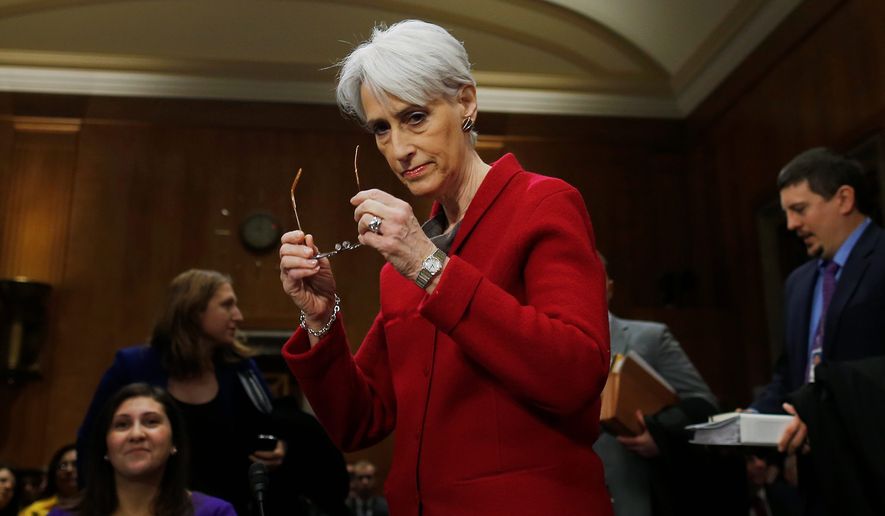The Obama administration’s top diplomat in the sensitive negotiations over Iran’s nuclear program has now been tapped to serve as acting deputy secretary of state.
The State Department confirmed Monday that Wendy R. Sherman — at the center of the nuclear talks in her current post as under secretary of state for political affairs — will take on the new role following the departure of William Burns, a career diplomat who announced his retirement from the department six months ago.
It was not clear Monday why the administration has not nominated Mrs. Sherman to hold the position on a permanent basis. Department spokeswoman Jennifer Psaki declined to comment on the matter, but confirmed that Mrs. Sherman will temporarily serve as both deputy secretary of state and political affairs undersecretary position — as well as continuing to take the lead in the Iran talks.
“She has superhuman abilities in diplomacy,” Ms. Psaki quipped when pushed Monday for an explanation of how long the State Department may be expected to run effectively with a single diplomat serving as Secretary of State John F. Kerry’s second and third in command.
Mrs. Sherman, who held various State Department positions when Bill Clinton was president during the 1990s and was appointed in 2011 to serve as under secretary of state by then-Secretary of State Hillary Rodham Clinton, “is a talented and experienced diplomat,” Ms. Psaki said.
“The fact that she was named acting deputy secretary of state just reflects the secretary’s trust in her, the trust of the building, the trust of the president, and obviously, her wealth of experience on a range of issues,” Ms. Psaki added. “Of anyone, she can certainly handle it.”
Pressed further for an assurance that the extra duties won’t result in Mrs. Sherman “taking her eye off the Iran nuclear ball,” Ms. Psaki responded that Mr. Burns along with Jake Sullivan, Vice President Joseph R. Biden Jr.’s former national security adviser, continue to be “very involved in the Iran negotiations.”
The talks, which were extended for six months in July, are now facing a major Nov. 24 deadline for an agreement to be reached between Iran and the so-called P5+1 group, the five permanent members of the U.N. Security Council — the U.S. Britain, France, Russia and China, plus Germany.
Western powers have for years suspected Iran is clandestinely pursuing nuclear weapons. Tehran denies the charge, claiming its nuclear program is for purely peaceful purposes, including electricity generation.
Ms. Psaki, meanwhile, also pushed aside questions on Monday about why the Obama administration has taken so long to nominate a replacement for Mr. Burns. While the decorated career diplomat stepped down from the deputy secretary of state post at the end of October, the White House and State Department have had months to find a replacement.
“I don’t think it’s a reflection of not being able to come up with a plausible candidate,” said Ms. Psaki, who added, “there are many talented candidates.”
Foreign policy insiders have suggested the administration is considering nominating Antony Blinken, currently the deputy national security adviser to President Obama, for the post.
The nominating procedures involve “a process that works through the inter-agency … that is not just the State Department,” Ms. Psaki said. “I am not in a position to give you any more details on that process.”
• Guy Taylor can be reached at gtaylor@washingtontimes.com.




Please read our comment policy before commenting.